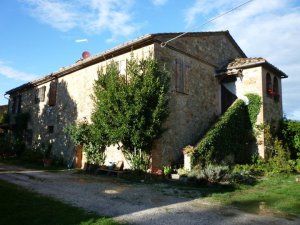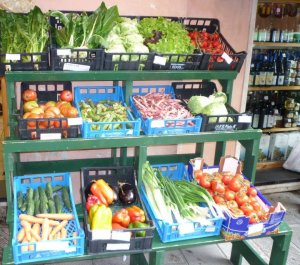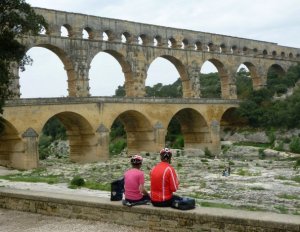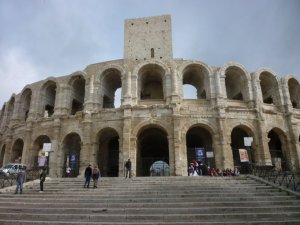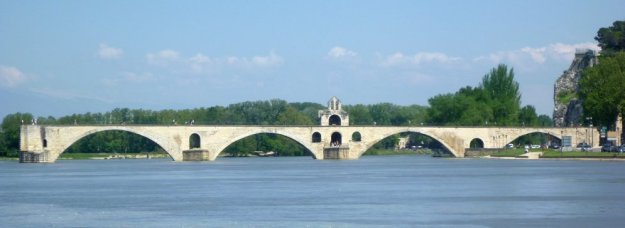When we told our senior friends we were going Couchsurfing in Provence, many of them had never even heard of Couchsurfing. Most of the rest expressed strong reservations about crashing on someone’s uncomfortable couch. By the time we headed for the airport, we were confident we’d find more comfortable sleeping arrangements.
Couchsurfing.org is one of the more popular “hospitality exchanges”. These sites and organizations offer travelers around the world short-stay accommodation with local hosts, with no expectation other than the pleasure of each other’s company… and maybe some help with dinner. The fundamental premise is that the cultural exchange is a two-way street, and the hosts should enjoy the experience as much as the travelers.
There are a number of hospitality exchanges, and some might be more suitable for the older traveler. If you “surf” with a 20-something host, there’s a good chance you will be sleeping on a couch. The average age of a Couchsurfer is 28, and only about 3% of users are over 50. Still with about 5 million members, that’s 150,000 “golden age” surfers and hosts.
We decided to search hosts who were couples over 50, something fairly easy to do on the site. We also restricted our searches to “verified” profiles with pictures, and read all the references carefully. The listings generally indicated that their offer of accommodation was at least a private bedroom. Still, to be on the safe side, we decided to try it out nearby before heading to France. (We’d done the same thing with AirBnB.) Our first Couchsurfing experience was in the seaside town of Sequim, Washington. Our host, Teresa, was both interesting and gracious, and the accommodation offered us by our new friend was as good as any an old friend might provide. After one more local test run, we were ready to try Europe.
Our chosen hosts in Avignon included facility with English on their profile, so we figured we could revert to our native tongue if our fractured French was found wanting. In our message exchange before our arrival, we were careful always to include a Google Translate French translation of every message we sent. It turned out to be unnecessary as our hosts were fluent in English.
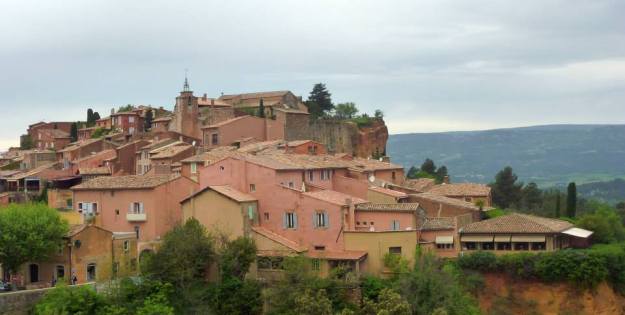
Roussillon, the “Colorado of Provence”, was one of the many local sites we visited with our hosts in Avignon
We were pleasantly surprised with the responses we got from our query. Another host who couldn’t accommodate us went out of her way to recommend nearby B&Bs and restaurants: “Tell them Pauline sent you.” We received an unsolicited offer of accommodation from a retired judge who’d spent six months in our hometown years earlier. By then we were already “booked” with the couple we’d selected.
Our hosts, Monique and Jean-Paul, had offered to meet us at the boat docks – later switched to the train station due to flooding on the Rhône. We easily spotted each other, and much to our delight, they proceeded to drive us – with a few sightseeing stops en route – to a 400-year old Provençal six-bedroom farmhouse, hidden away on a quiet country lane, and surrounded by vinyards and fruit trees. Our “couch” turned out to be a very comfortable bed in a second-story bedroom with ensuite, balcony overlooking the gardens, and kitchen facilities. The kitchen was
hardly needed as our hosts fed us delicious healthy home-cooked French cuisine three meals a day for our entire stay. In addition, they drove us to many area attractions – including some we’d never heard of, and certainly would never have visited but for their hospitality. What’s more, given their patience with our halting efforts, our French improved dramatically over just two days – although it never got anywhere near as good as their English.
Our visit to Avignon was a perfect example of the objectives of hospitality exchanges. We talked about many subjects over our two days, comparing French ways of doing things to those back home – not to mention all the other countries that each of us had visited. Like many Couchsurfers, our hosts were globetrotters, so we had the chance to live their adventures vicariously – as did they with ours.. And pick up some tips for the road. It was the most memorable two days of our entire trip. Couchsurfing will be high on our list for our next trip. We’d recommend it for yours.
If you still feel uncomfortable and are looking for ways to start gradually, there are some alternatives you might try. One is a much older hospitality exchange called Servas.
Servas has been around since just after World War II. In many ways, it’s similar to Couchsurfing, but “older”. Servas chapters operate independently in each country, and maintain paper lists of hosts. Only gradually and tentatively are they experimenting with Internet directories. Travelers must supply two letters of reference and be interviewed by a local Servas volunteer before receiving their official “letter of introduction” and the directory of hosts for their target countries. In our experience, the average age of Servas hosts is older, perhaps even in the 50+ range. The Servas accommodation we’ve seen has generally been at least a spare bedroom, if not more.
We were Servas members before we joined Couchsurfing, our second membership because the latter offered more convenient access via the Internet. We still love Servas and have had great adventures with them as well, including a stay in a remote organic sheep-cheese farm in Tuscany, and a cozy family apartment on the Italian Riviera. In both these stays, we had lots of
time for local sightseeing. (One memorable experience at the last place was witnessing a typical argument between the mother and her teenaged daughter. Out of deference to their guests, they switched from Italian to making points in English, leaving the father scratching his head … since he only spoke Italian and Genoese!)
Another way to ease in to the hospitality exchange concept is to arrange for a “day host” as it’s known in Servas. (Couchsurfing has a similar concept.) A day host meets a traveler during the day for a few hours to show them around, or engage in some joint activity. For instance, while in Florence, we arranged to meet for capuccinos with a Servas day host who turned out to be a professional tour guide. Surprisingly, we didn’t end up picking his brains for tips on the Uffizi Gallery, but instead learned of his excitement about the family’s impending trip to Colombia to adopt a young girl.
Is there an obligation to host in return for being hosted? Not in Couchsurfing nor in Servas. It’s more of a “karma” thing; I’m sure there’s a special hell reserved for travelers who never host. Perhaps it’s an endless stay in a characterless chain hotel. But most travelers enjoy hosting as much as visiting. After all, most of us can’t travel all the time, and hosting is inexpensive way to experience the world from the comfort of your own home. In the year and a half we’ve belonged to Couchsurfing, and the longer time we’ve been Servas members, we’ve hosted more often than we’ve traveled. And enjoyed every one. We’ll share a few recent hosting adventures in a future post.
Maybe the next one will be you?
- “Travel Wise / Young or old, you can couchsurf and sleep cheaply worldwide” (Seattle Times)
- Servas Open Doors – background here
- Couchsurfing.org – and some criticism
- Other hospitality exchanges (which we haven’t tried)


